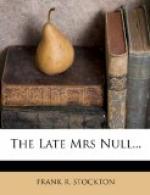“Oh dear! oh dear!” exclaimed Annie. “We shall have a dreadful time! When Aunt Keswick knows that there never was any Mr Null, and then hears that you and I are engaged, it will throw her into the most dreadful state of mind that she has ever been in, in her life; and father has told me of some of the awful family earthquakes that Aunt Keswick has brought about, when things went wrong with her.”
“We must be very cautious,” said Lawrence, “and neither of us must say a word, or do anything that may arouse her suspicions, until we have settled upon the best possible method of making the facts known to her. The case is indeed a complicated one.”
“And what makes it more so,” said Annie, “is Aunt Keswick’s belief that you are in love with Miss March, and that you want to get a chance to propose to her. She does think that, doesn’t she?”
“Yes,” said Lawrence, “I must admit that she does.”
“And she must be made to understand that that is entirely at an end,” continued Annie. “All this will be a very difficult task, Lawrence, and I don’t see how it is to be done.”
“But we shall do it,” he answered, “and we must not forget to be very prudent, until it is fully settled how we shall do it.”
When Lawrence retired to his room, and sat down to hold that peculiar court in which he was judge, jury, lawyers, and witnesses, as well as the prisoner at the bar, he had to do with a case, a great deal more complicated and difficult than that which perplexed the mind of Miss Annie Peyton. He began by the very unjudicial act of pledging himself, to himself, that nothing should interfere with this new, this true love. In spite of all that might be said, done, or thought, Annie Peyton should be his wife. There was no indecision, whatever, in regard to the new love; the only question was: “What is to be done about the old one?”
Lawrence could not admit, for a moment, that he could have spoken to Roberta March as he had spoken, if he had not loved her; but he could now perceive that that love had been in no small degree impaired and weakened by the manner of its acceptance. The action of Miss March on her last day here had much more chilled his ardor than her words on Pine Top Hill. He had not, before, examined thoroughly into the condition of that ardor after the departure of the lady, but it was plain enough now.
There was, therefore, no doubt whatever in regard to his love for Miss March; he was quite ready and able to lay that aside. But what about her acceptance of it? How could he lay that aside?
This was the real case before the court. The witnesses could give no available testimony, the lawyers argued feebly, the jury disagreed, and Lawrence, in his capacity of judge, dismissed the case. In his efforts to conduct his mind through the channels of law and equity, Lawrence had not satisfied himself, and his thoughts began to be moved by what might be termed his military impulses. “I made a charge into the camp,” he said with a little downward drawing of the corners of his mouth, “and I did not capture the commander-in-chief. And now I intend to charge out again.”




